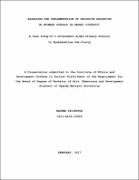Assessing the implementation of inclusive education in primary schools in Kagadi District
Abstract
Inclusive education has emerged globally as one of the most dominant issues for the education of children with special needs. The past 40 years has seen the field of special needs education move from the segregation paradigm through integration to a point where inclusion is central to contemporary discourse.
This research aimed at assessing the implementation of inclusive education in Kagadi district using a case study of three selected government aided primary schools in Kyakabadiima Sub County. The specific objectives were; to establish the availability of specially trained teachers for the implementation of inclusive education in primary schools in Kyakabadiima Sub County, to find out the availability of resources to facilitate inclusive education and assessing the availability of supportive policy and leadership that enhance the implementation of inclusive education in primary schools in Kyakabadiima Sub County.
The study design was a multiple case study, in which three government aided primary schools were selected. A sample of 56 respondents was used which included 11 guardians, 24 pupils, 18 teachers and 3 head teachers. The selection of staff was by purposive sampling while pupils were selected by random sampling. Data was collected through use of questionnaire, interviews and observation. Data was analyzed using qualitative and quantitative means.
The study findings revealed that schools had few specially trained teachers to cater for the education needs of children with disabilities. It also revealed that resources such as; financial resources, instructional materials, adoptive class and sanitary structures were all inadequate yet they are basics for the effective implementation of inclusive education. It was mentioned that, the policy on inclusive education was not well known to most staff who were charged with inclusive education.
The study concluded that, whereas various interventions have been made to enhance access to inclusive education, little success had been achieved. The study recommends government to establish good education facilities like classes, sanitary structures which are adoptive to disabled children in order to enhance accessibility by all children. Specially trained teachers should be trained and government should emphasize on the inclusive policy implementation throughout the country.


